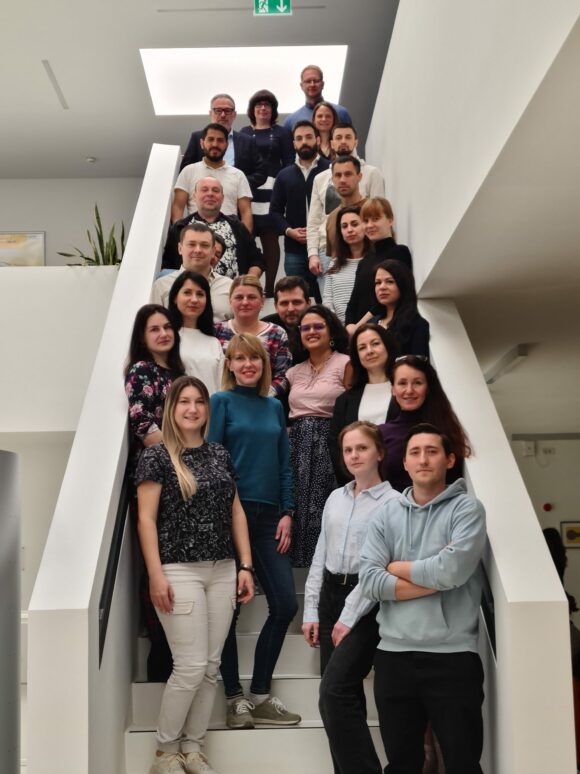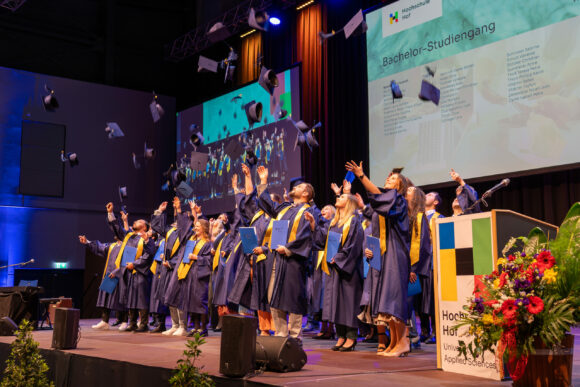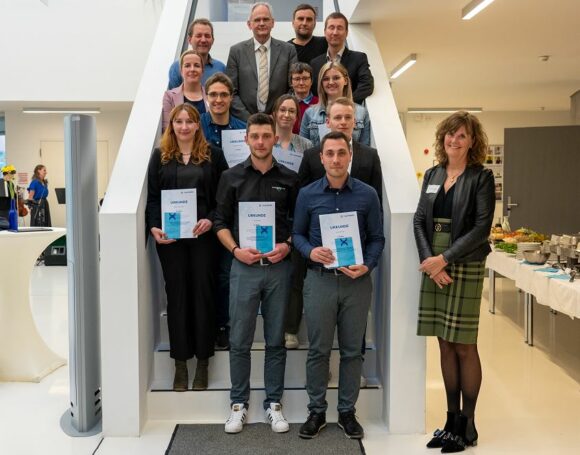The topic of entrepreneurship is booming at German universities and is increasingly becoming a distinguishing feature. This is best illustrated by the number of entrepreneurship chairs, which has risen to over 140 professorships at public and private universities in Germany in recent years. One of the reasons for this trend is that founders play an important role in the economy, as they are often drivers of growth, innovation and regional structural change. At Hof University of Applied Sciences, a remarkable ecosystem for founders has emerged in recent years, and its first successes are already visible.

At least business administration (BWL) needed some time before it started to take an interest in small startups and the entrepreneur in his personality. In the meantime, however, business administration in particular has become the discipline that makes significant research contributions to entrepreneurship and provides many education and training modules accordingly. In parallel, startups are also increasingly being discovered by regions as a development engine and image factor. If the development of Silicon Valley or Berlin is considered, the potential of startups for regional structural development becomes immediately clear, even if such developments can only be reproduced to a limited extent. In the context of the Third Mission, universities are often “the spider in the web” in regional startup ecosystems, i.e. the connecting element.
Initiative “Gründerland Bayern” as a pioneer
The model of Silicon Valley was also decisive for the Bavarian state government when it – represented by the Bavarian State Ministry of Economic Affairs, Regional Development and Energy – launched the “Gründerland Bayern” initiative a few years ago. It supports budding entrepreneurs with offers on financing and funding, consulting and coaching, networks and infrastructure, and the right way to start up. It is aimed at founders in all sectors and at every stage of the start-up process – from the preparation of a business plan and the search for suitable financing to the growth phase. Gründerland Bayern supports both start-ups and company successions.
At the heart of the campaign are 19 digital incubators at 28 locations, as well as a further 40 or so general and technology-oriented incubators. The following services are provided:
- Office and storage space at affordable rent as well as coworking,
- shared office and presentation equipment,
- Services such as reception, secretarial, telephone and mail services, as well as press and public relations,
- Advice and assistance in contact with authorities and institutions,
- Assistance with grant applications, funding and other official correspondence, professional meetings, seminars, contact and networking events.
At Hof University of Applied Sciences, the Digital Startup Center Einstein1 is the heart of the Entrepreneurial Ecosystem and is consequently located in the middle of the university campus.
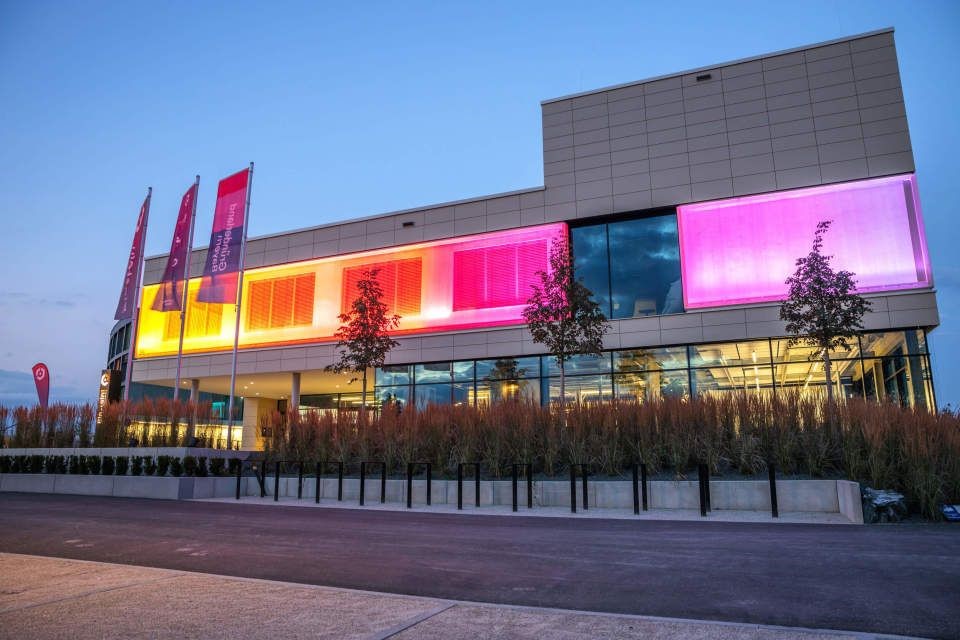
The Digital Incubator Einstein 1
The central location on campus is a basic prerequisite for sufficient frequency, but equally for curated openness – in other words, a culture of encounter and mutual inspiration. This can be experienced through the open doors of the incubator, as well as through a café atmosphere in the entrance area and in the coworking space. The building sets itself apart architecturally from other buildings on campus: the open space on the ground floor can be used flexibly for events of all kinds, as can the roof terrace, which invites people to be creative and linger above the rooftops of the city. On the second floor in between, everything is a bit more serious. Up to ten startup teams have their own offices there, where they can work on their projects undisturbed. But even there, glass walls and a small café and fitness area invite people to meet and network. The success of the model is illustrated by the following three points:
- A good year after opening, the majority of the startup offices had already been leased.
- The building acts as a magnet and bundles startup-relevant events not only from the university, but also from chambers, regional authorities and business development agencies. The regional economy is integrated via ideation and design thinking workshops and supported in its digitalization.
- A meeting place for the start-up scene of the entire region has emerged. This is expressed in almost weekly networking events (e.g., Digital Thursday), where there is plenty of room for getting to know each other and mutual inspiration in addition to the actual specialist topics.
Close cooperation with politics and business
Since a startup infrastructure in rural areas is not a foregone conclusion, the university and the three regional authorities in Upper Franconia have joined forces to form a limited liability company (GmbH), with significant support from the regional business community through long-term sponsorship commitments. The support services are embedded in a whole range of services available to those willing to start up a business on campus and are supplemented in the early phase by interface management with the start-up trainees and start-up teaching at Hof University of Applied Sciences (see Figure 2).
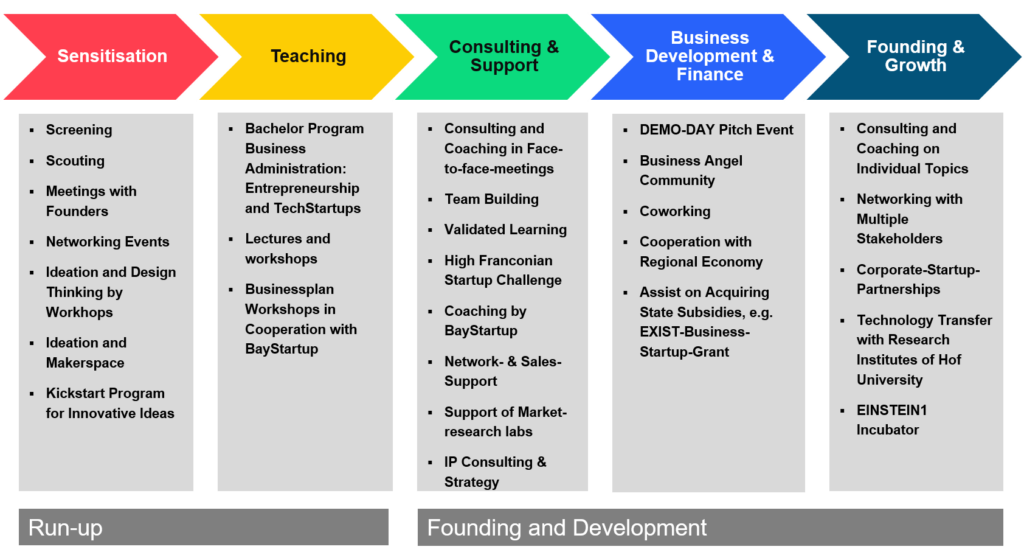
Offerings for a successful customer journey
The founder-related Customer Journey comprises a variety of offers that address both the pre-start-up phase and the start-up and growth phase of young companies in the sense of an “end-to-end approach”.
In the pre-start-up phase, Hof places a great deal of emphasis on idea generation and on raising awareness of self-employment as an alternative to a career in SMEs or large companies
Entrepreneurship teaching is generally based on curricular offerings and includes in particular the field of study “Business Administration, especially Entrepreneurship and Tech Startups” as well as master’s programs in the area of digitalization. To ensure the necessary interdisciplinarity, the courses are opened up to many degree programs at the same time. For example, in the module “Developing and Designing Business Models,” teams with different professional backgrounds work on innovative startup ideas and are accompanied not only by the lecturer, but also by coaches and mentors from the support network. This is intended to ensure a sufficient deal flow for subsequent individual support and consulting services as well as a replenishment of interesting tenants in the incubator.
Interdisciplinary teaching formats
In order to depict the start-up ecosystem holistically and to support it with attractive offers, interdisciplinary teaching formats were expanded in Hof and partly integrated into curricular forms in order to generate young founders from other disciplines such as engineering or computer science. These include, for example, the “Ideationweek” as well as various workshops and the Makerspace open to all university members, a kind of open digital manufacturing laboratory based on the Fablab model, which enables low-threshold testing of ideas, the production of prototypes from research projects of university members and the introduction to the start-up mentality already at an early stage of studies or even at a higher school age. Hof University of Applied Sciences was able to realize this early phase with the help of funding from the German Federal Ministry of Education and Research as part of the StartUpLab@FH initiative.
Exchange with BayStartUP
The regional support system interacts with the Bavaria-wide support systems. For example, regular coaching sessions are held by BayStartUP in all Bavarian startup centers. A regional business angels network is also being established in Hof, which makes valuable contributions to early-stage financing.
Read also:
How a successful Costumer Journey can look like in practice within the start-up ecosystem of Hof University – an example based on BtX energy GmbH.




